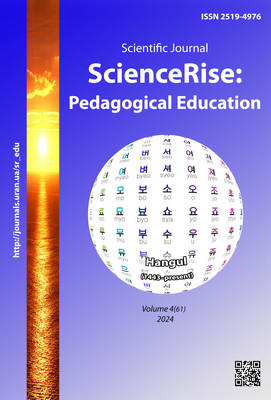Results of the implementation of the model of scientific and methodological system of training future primary school teachers to organize a safety-oriented educational environment under conditions of risks
DOI:
https://doi.org/10.15587/2519-4984.2024.315485Keywords:
pedagogical modeling, professional training, future primary school teachers, safety-oriented educational environment, risks, health, safetyAbstract
The article is devoted to the problem of professional training of future primary school teachers to organize a safety-oriented educational environment under conditions of risks in the context of reforming the educational system in Ukraine and taking into account global changes in all the spheres of human life, challenges, risks, and threats. The purpose of the article is to highlight the results of the experimental testing of the implementation of a model of a scientific and methodological system for the professional training of future primary school teachers to organize a safety-oriented educational environment under conditions of risks, which is due to the need to ensure quality primary education without endangering the life and health of all participants in the educational process, taking into account modern educational risks and threats. The implementation of the model involved updating psychological and pedagogical approaches, content, and theoretical and methodological substantiation of the professional training of future primary school teachers for this type of activity. The result of the model implementation is the formation of the readiness of future primary school teachers to organize a safety-oriented educational environment under conditions of risks. The diagnostic tools for experimental verification of the results of the model implementation are determined. The effectiveness of the implementation of the model of the scientific and methodological system of professional training of future primary school teachers for the organization of a safety-oriented educational environment under conditions of risks, which is presented in the results of the pedagogical experiment and is reflected in a statistically significant decrease in the proportion of future teachers with a low level of readiness to organize a safety-oriented educational environment under conditions of risks compared to the ascertaining stage of the study against the background of a significant increase in the proportion of future teachers with high and middle levels of readiness to organize a safety-oriented educational environment under conditions of risks, is proved.
References
- Pro osvitu (2017). Zakon Ukrainy No. 2145-VIII. 05.09.2017. Available at: https://zakon.rada.gov.ua/laws/show/2145-19#Text
- Stratehiia rozvytku vyshchoi osvity v Ukraini na 2022–2032 roky (2022). Rozporiadzhennia Kabinetu Ministriv Ukrainy No. 286-r. 23.02.2022. Available at: https://zakon.rada.gov.ua/laws/show/286-2022-%D1%80#Text
- Kontseptsiia realizatsii derzhavnoi polityky u sferi reformuvannia zahalnoi serednoi osvity "Nova ukrainska shkola" na period do 2029 roku (2016). Rozporiadzhennia Kabinetu Ministriv Ukrainy No. 988-r. 14.12.2016. Available at: https://imzo.gov.ua/osvita/nush/
- Profesiinyi standart za profesiiamy «Vchytel pochatkovykh klasiv zakladu zahalnoi serednoi osvity», «Vchytel zakladu zahalnoi serednoi osvity», «Vchytel z pochatkovoi osvity (z dyplomom molodshoho spetsialista)» (2020). Zatverdzheno nakazom Ministerstva rozvytku ekonomiky, torhivli ta sil. hospodarstva Ukrainy No. 2736. 23.12.2020. Available at: https://testportal.gov.ua/wp-content/uploads/2023/01/Nakaz_2736.pdf
- Honcharenko, S. U. (2011). Ukrainskyi pedahohichnyi entsyklopedychnyi slovnyk. Rivne: Volynski oberehy, 34.
- Dubaseniuk, O. A. (2008). Kontseptualni modeli pedahohichnoi osvity: naukovi poshuky ta zdobutky. Profesiino-pedahohichna osvita: suchasni kontseptualni modeli ta tendentsii rozvytku. Zhytomyr: ZhDU im. I. Franka, 10.
- Kovalchuk, L., Lushchynska, O. (2020). The model of formation of information and communication culture of future primary school teachers in the process of professional training. Youth & market, 6/185, 122–127.
- Zhuzeyev, S., Zhailauova, M., Makasheva, A. P., Jumagulova, M. S., Aidarov, O., Kassymbekova, A. (2024). Professional Training of Future Primary School Teachers Based on Kazakh National Identity. Novitas-ROYAL (Research on Youth and Language), 18 (1), 155–168.
- Harkusha, S. V. (2014). Model formuvannia hotovnosti maibutnikh fakhivtsiv fizychnoho vykhovannia do vykorystannia zdoroviazberezhuvalnykh tekhnolohii. Visnyk Chernihivskoho natsionalnoho pedahohichnoho universytetu. Seriia: Pedahohichni nauky. Fizychne vykhovannia ta sport, 118 (2), 94–99.
- Dolynskyi, B. T. (2011). Teoretyko-metodychni zasady pidhotovky maibutnikh uchyteliv do formuvannia zdoroviazberezhuvalnykh navychok i vmin u molodshykh shkoliariv u navchalno-vykhovnii diialnosti [Doctoral dissertation; Pivdennoukrainskyi natsionalnyi pedahohichnyi universytet imeni K. D. Ushynskoho].
- Tsybulska, O. (2020). Formuvannia hotovnosti maibutnikh uchyteliv pochatkovoi shkoly do vykhovannia u molodshykh shkoliariv kultury zdoroviazberezhennia [PhD dissertation; Volynskyi natsionalnyi universytet imeni Lesi Ukrainky].
- Laurencelle, L. (2021). The statistical handling of proportions including analysis of variance, with worked out examples. The Quantitative Methods for Psychology, 17 (3), 272–285. https://doi.org/10.20982/tqmp.17.3.p272
- Felix, C. S., Felix, C. M. (2024). Literature review: basic statistics in educational research. Cognizance Journal of Multidisciplinary Studies, 4 (3), 206–215. https://doi.org/10.47760/cognizance.2024.v04i03.018
- Martin Andrés, A. (1991). A review of classic non-asymptotic methods for comparing two proportions by means of independent sampLES. Communications in Statistics – Simulation and Computation, 20 (2-3), 551–583. https://doi.org/10.1080/03610919108812972
- Krishnamoorthy, K., Thomson, J. (2002). Hypothesis Testing About Proportions in Two Finite Populations. The American Statistician, 56 (3), 215–222. https://doi.org/10.1198/000313002164
- Taimasov, Yu. (2020). Teoretychni i metodychni zasady pidhotovky maibutnikh fakhivtsiv sluzhby tsyvilnoho zakhystu do samozberezhennia u profesiinii diialnosti [Doctoral dissertation; Kharkivskyi natsionalnyi pedahohichnyi universytet imeni H. S. Skovorody].
Downloads
Published
How to Cite
Issue
Section
License
Copyright (c) 2024 Nataliia Naumenko, Maryna Nessonova

This work is licensed under a Creative Commons Attribution 4.0 International License.
Our journal abides by the Creative Commons CC BY copyright rights and permissions for open access journals.
Authors, who are published in this journal, agree to the following conditions:
1. The authors reserve the right to authorship of the work and pass the first publication right of this work to the journal under the terms of a Creative Commons CC BY, which allows others to freely distribute the published research with the obligatory reference to the authors of the original work and the first publication of the work in this journal.
2. The authors have the right to conclude separate supplement agreements that relate to non-exclusive work distribution in the form in which it has been published by the journal (for example, to upload the work to the online storage of the journal or publish it as part of a monograph), provided that the reference to the first publication of the work in this journal is included.







